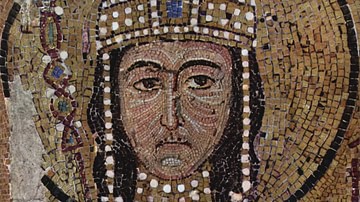Search Definitions
Browse Content (p. 178)

Definition
Asia Minor
Ancient Asia Minor is a geographic region located in the south-western part of Asia comprising most of present-day Turkey. The earliest reference to the region comes from tablets of the Akkadian Dynasty (2334-2083 BCE) where it was known...

Definition
Aztec Sacrifice - How the Aztecs Kept Their Gods Happy
The religion of the Aztec civilization which flourished in ancient Mesoamerica (1345-1521 CE) has gained an infamous reputation for bloodthirsty human sacrifice with lurid tales of the beating heart being ripped from the still-conscious victim...

Definition
Anna Komnene
Anna Komnene (aka Anna Comnena, 1083-1153 CE) was the eldest daughter of Byzantine emperor Alexios I Komnenos (r. 1081-1118 CE) and the author of a lengthy biography of her father's reign, the Alexiad. Although not an impartial history, Anna's...

Definition
Roman Gladiator
A Roman gladiator was an ancient professional fighter who usually specialised with particular weapons and types of armour. They fought before the public in hugely popular organised games held in large purpose-built arenas throughout the Roman...

Definition
Peloponnesian War
The Peloponnesian War between Athens and Sparta and their respective allies came in two stages: from c. 460 to 446 and from 431 to 404 BCE. With battles at home and abroad, the long and complex conflict was damaging to both sides. Sparta...

Definition
Assyrian Warfare
Assyria began as a small trading community centered at the ancient city of Ashur and grew to become the greatest empire in the ancient world prior to the conquests of Alexander the Great and, after him, the Roman Empire. While the Assyrians'...

Definition
The Hittites
The Hittites occupied the ancient region of Anatolia (also known as Asia Minor, modern-day Turkey) prior to 1700 BCE, developed a culture apparently from the indigenous Hatti (and possibly the Hurrian) people, and expanded their territories...

Definition
Silk Road
The Silk Road was a network of ancient trade routes, formally established during the Han Dynasty of China in 130 BCE, which linked the regions of the ancient world in commerce between 130 BCE-1453 CE. The Silk Road was not a single route...

Definition
Roman Emperor
Roman emperors ruled the Roman Empire starting with Augustus in 27 BCE and continuing in the West until the late 5th century CE and in the Eastern Roman Empire up to the mid-15th century CE. The emperors took titles such as Caesar and Imperator...

Definition
Geghard
Geghard (Armenian: Geghardavank or "monastery of the spear") is a medieval monastery located in Armenia's Kotayk province, deep within the Azat Valley, which was built directly out of an adjacent mountain. Geghard is renown throughout Armenia...